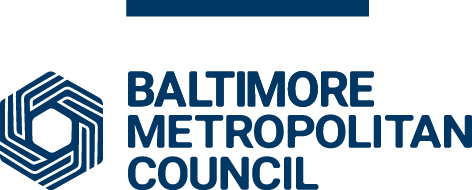El Comité Regional de Compras Cooperativas de Baltimore comparte la base de datos de contratos
BALTIMORE, MD (miércoles 31 de enero de 2024) – El Comité Regional de Compras Cooperativas de Baltimore (BRCPC) está lanzando una base de datos abierta de contratos regionales, haciendo accesible al público detalles sobre las compras de alto volumen de productos y servicios del grupo.
Con el respaldo del Consejo Metropolitano de Baltimore (BMC), el BRCPC proporciona un foro para que los gobiernos estatales y locales, las escuelas públicas, los colegios comunitarios, las organizaciones sin fines de lucro y otras agencias compren al por mayor, aprovechando su poder adquisitivo colectivo para asegurar mejores tarifas y ahorrar millones en gastos como como energía, vehículos, mobiliario de oficina, software y servicios como guardería.
Los miembros de BRCPC anteriormente mantenían una base de datos interna con miles de proveedores. Ahora cualquiera puede acceder al recurso en línea a través de baltometro.org/member-portal/regional-purchasing-database.
"Nuestros miembros utilizan la base de datos a diario", dijo Debbie Groat, coordinadora de compras cooperativas de BMC. "Se ha convertido en una herramienta esencial en la región y, al hacerlo público, puede actuar como un recurso confiable tanto para funcionarios gubernamentales como para proveedores".
La base de datos creció orgánicamente con el tiempo y los miembros del comité decidieron el año pasado abrir el recurso para ayudar a más compradores en toda la región a encontrar oportunidades de licitación y contratación cooperativa. BMC actualizará la base de datos dos veces al año.
"Estamos entusiasmados de compartir esta herramienta con la región de Baltimore", dijo el director ejecutivo de BMC, Mike Kelly. "Servirá como un recurso poderoso para conectar oportunidades de licitación y proveedores".
Kelly señaló que muchos de los miembros del BRPCP son agencias públicas, lo que significa que el dinero ahorrado en estos contratos masivos libera fondos para servicios públicos. Las colaboraciones fomentadas a través del BRCPC ayudan a los contribuyentes a ahorrar en grandes partidas, como la electricidad para las escuelas públicas. El año pasado, la Junta de Energía del BRCPC ahorró $73,6 millones en energía en comparación con las tarifas estándar de BGE, y ha ahorrado más de $290 millones en energía desde su lanzamiento en 2007.
Obtenga más información sobre BRCPC y consulte la base de datos de contratos regionales en baltometro.org/member-portal/regional-purchasing-database o enviando un correo electrónico a Debbie Groat a dgroat@baltometro.org.
###
El Consejo Metropolitano de Baltimore proporciona un foro regional para que los miembros, socios estatales y locales identifiquen intereses mutuos y colaboren en estrategias, planes y programas que ayuden a mejorar la vitalidad económica y la calidad de vida para todos.
BMC opera sus programas y servicios sin distinción de raza, color u origen nacional de acuerdo con el Título VI de la Ley de Derechos Civiles de 1964 y otras leyes aplicables. Se pueden brindar servicios apropiados a personas calificadas con discapacidades o aquellos que necesitan asistencia lingüística que presenten una solicitud al menos siete días antes de una reunión. Llame al 410-732-0500. Marque 7-1-1 o 800-735-2258 para iniciar una llamada TTY a través de Maryland Relay. Si necesita información del Título VI en español, llame al 410-732-0500.


BALTIMORE, MD (Wednesday, January 31, 2024) – The Baltimore Regional Cooperative Purchasing Committee (BRCPC) is launching an open database of regional contracts, making details about the group’s high-volume purchasing of commodities and services accessible to the public.
Supported by Baltimore Metropolitan Council (BMC), the BRCPC provides a forum for state and local governments, public schools, community colleges, nonprofits and other agencies to buy in bulk, leveraging their collective purchasing power to secure better rates and save millions on expenditures such as energy, vehicles, office furniture, software and services like daycare.
BRCPC members previously maintained an internal database with thousands of vendors. Now, anyone can access the resource online via baltometro.org/member-portal/regional-purchasing-database.
“Our members use the database daily,” said Debbie Groat, BMC’s cooperative purchasing coordinator. “It has become an essential tool in the region, and by making it public-facing, it can act as a trusted resource for government officials and suppliers alike.”
The database grew organically over time, and committee members decided last year to open up the resource to help more purchasers throughout the region find cooperative contracting and bidding opportunities. BMC will update the database twice a year.
“We’re excited to share this tool with the Baltimore region,” said BMC Executive Director Mike Kelly. “It will serve as a powerful resource for connecting bidding opportunities and vendors.”
Kelly noted that many of BRPCP members are public agencies, meaning that money saved on these bulk contracts frees up funding for public services. The collaborations fostered through the BRCPC help taxpayers save on huge line items like electricity for public schools. Last year, the BRCPC’s Energy Board saved $73.6 million on energy compared to BGE’s standard rates, and has saved more than $290 million on energy since launching in 2007.
Learn more about the BRCPC and check out the regional contract database at baltometro.org/member-portal/regional-purchasing-database or by emailing Debbie Groat at dgroat@baltometro.org.
###
Baltimore Metropolitan Council provides a regional forum for members, state and local partners to identify mutual interests and collaborate on strategies, plans and programs that help improve economic vitality and quality of life for all.
BMC operates its programs and services without regard to race, color or national origin in accordance with Title VI of the Civil Rights Act of 1964 and other applicable laws. Appropriate services can be provided to qualified individuals with disabilities or those in need of language assistance who submit a request at least seven days prior to a meeting. Call 410- 732-0500. Dial 7-1-1 or 800-735-2258 to initiate a TTY call through Maryland Relay. Si se necesita información de Título VI en español, llame al 410-732-0500.
BMC Energy Board obtiene ahorros récord de $32,5 millones
BALTIMORE, MD (lunes, 19 de septiembre de 2022) – Un subcomité de compra de energía del Consejo Metropolitano de Baltimore (BMC) ahorró un récord de $32,5 millones en electricidad en el año fiscal 2022, y ha ahorrado un total de $216,5 millones desde su creación en 2006 en comparación a la alternativa de tarifa fija del servicio de oferta estándar de la empresa eléctrica local (BGE).
La Junta de Energía, un subcomité del Comité de Compras Cooperativas Regionales de Baltimore (BRCPC) de BMC, supervisa la compra de energía para los participantes, incluidos los gobiernos de ciudades y condados, escuelas públicas, colegios comunitarios y algunas organizaciones sin fines de lucro en todo el centro de Maryland. Las carteras combinadas de estos participantes, que incluyen electricidad y gas natural, representaron un gasto anual en suministro de energía de $107 millones en el año fiscal 2022.
El director ejecutivo de BMC, Mike Kelly, celebró el ahorro récord, que ayuda a amortiguar el aumento en los precios de la energía que enfrentan los participantes y las comunidades de la Junta de Energía en toda la región.
“En BMC estamos comprometidos a trabajar con nuestras agencias asociadas para apoyar la salud y la prosperidad de la región”, dijo Kelly. “Los ahorros generados por la Junta de Energía ilustran que juntos somos más fuertes”.
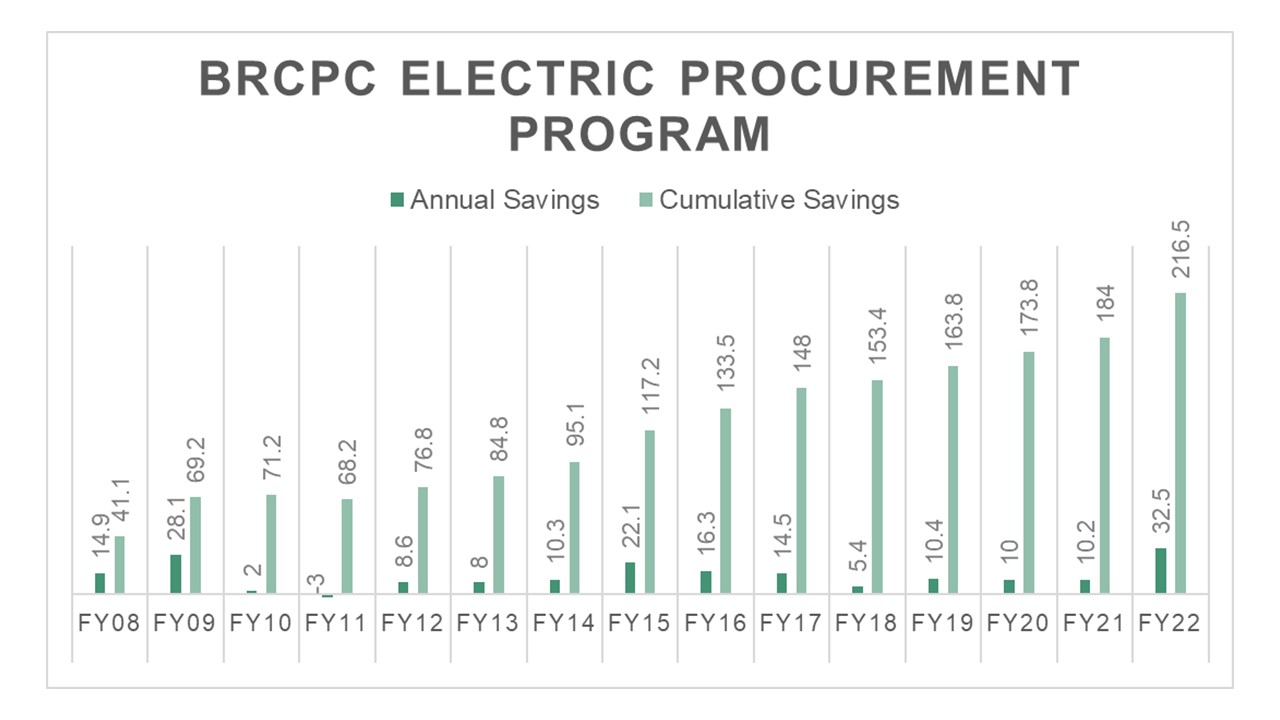
Con un gasto anual en suministro de energía de $107 millones en el año fiscal 2022, la Junta de Energía es el mayor cliente de Baltimore Gas & Electric (BGE).
El presidente de la Junta de Energía, Matthew Carpenter, jefe de presupuesto y administración del condado de Baltimore, señaló que, dado que los precios han aumentado en muchos sectores, el precio de la electricidad y el gas natural ha experimentado algunos de los aumentos más pronunciados. Según un índice de precios al consumidor de la Oficina de Estadísticas Laborales publicado en marzo, el costo de la electricidad en la región de Baltimore aumentó un 18,4 por ciento en comparación con el año anterior, mientras que el costo del gas natural aumentó un 21,2 por ciento.
Explicó que los participantes de la Junta de Energía cubren colectivamente las compras de electricidad y gas natural durante un período de tres años, evitando los costos en los que incurrirían si los participantes individuales compraran energía a la tarifa estándar y ayudando a disminuir los impactos de los picos volátiles en el mercado de la energía.
“La estrategia de la Junta de Energía definitivamente ha valido la pena”, dijo Carpenter. “Este nivel de evasión de costos brinda la garantía de que los miembros se han tomado muy en serio la gestión de sus fondos públicos”.
El ejecutivo del condado de Harford, Barry Glassman, presidente de la junta de BMC, elogió el trabajo de la Junta de Energía como una colaboración bienvenida.
“Estoy orgulloso del papel de BMC en la obtención de estos ahorros”, dijo Glassman. “Ahora más que nunca, necesitamos más de este pensamiento inteligente y fiscalmente responsable en Maryland”.
Noel Chesser, asesor principal de la consultora de la Junta de Energía Enel X, dijo que dado que los precios mundiales del petróleo y el gas natural experimentaron aumentos históricos debido a una convergencia de factores, Enel X ha ayudado a los participantes con esfuerzos de ahorro de costos y energía. Señaló que Enel X también ha estado atento a los desarrollos en energía renovable y continuará ayudando a los participantes de la Junta de Energía a disminuir la dependencia de las fuentes de energía no renovables.
Para obtener más información sobre el Consejo de Energía, haga clic aquí.
###
El Consejo Metropolitano de Baltimore (BMC) trabaja en colaboración con los principales funcionarios electos de la región para crear iniciativas para mejorar nuestra calidad de vida y vitalidad económica. BMC, como el consejo de gobiernos de la región de Baltimore, alberga la Junta Regional de Transporte de Baltimore (BRTB), la organización federal de planificación metropolitana (MPO), y apoya al gobierno local mediante la coordinación de esfuerzos en una variedad de áreas de política que incluyen preparación para emergencias, vivienda, compras cooperativas. , planificación ambiental y desarrollo de la fuerza laboral.
La junta directiva de BMC incluye a los ejecutivos de los condados de Anne Arundel, Baltimore, Harford y Howard, el alcalde de la ciudad de Baltimore, miembro de las juntas de comisionados del condado de Carroll y del condado de Queen Anne, miembro del Senado del estado de Maryland, miembro de la Cámara de Delegados de Maryland, y un gobernador designado del sector privado.


BALTIMORE, MD (Monday, September 19, 2022) – A Baltimore Metropolitan Council (BMC) subcommittee on energy purchasing saved a record $32.5 million on electricity in fiscal year 2022, and has saved a total of $216.5 million since its inception in 2006 when compared to the local electric utility (BGE) standard offer service fixed rate alternative.
The Energy Board, a subcommittee of BMC’s Baltimore Regional Cooperative Purchasing Committee (BRCPC), oversees energy procurement for participants including city and county governments, public schools, community colleges and a few nonprofits throughout central Maryland. The combined portfolios of these participants, including both electricity and natural gas, represented an annual energy supply spend of $107 million in fiscal year 2022.
BMC Executive Director Mike Kelly celebrated the record saving, which helps cushion the surge in energy prices that Energy Board participants and communities are facing throughout the region.
“We at BMC are committed to working with our partner agencies to support the health and prosperity of the region,” Kelly said. “The savings generated by the Energy Board illustrate that we’re stronger together.”

Energy Board Chair Matthew Carpenter, Baltimore County’s Chief of Budget and Administration, noted that as prices have risen in many sectors, the price of electric and natural gas has seen some of the steepest increases. According to a Bureau of Labor Statistics consumer price index released in March, the cost of electricity in the Baltimore region jumped 18.4 percent compared to the previous year, while the cost of natural gas jumped 21.2 percent.
He explained that the Energy Board participants collectively hedge electric and natural gas purchases over a three-year period, avoiding costs that would incur if individual participants purchased power at the standard rate and helping to lessen the impacts of volatile spikes in the energy market.
“The Energy Board’s strategy has definitely paid off,” Carpenter said. “This level of cost avoidance provides assurance that the members have taken the management of their publicly-entrusted funds very seriously.”
Harford County Executive Barry Glassman, BMC’s board chair, hailed the work of the Energy Board as a welcome collaboration.
“I’m proud of BMC’s role in securing these savings,” Glassman said. “Now more than ever, we need more of this smart, fiscally-responsible thinking in Maryland.”
Noel Chesser, a principal advisor with Energy Board consultant Enel X, said that as global oil and natural gas prices saw historic increases due to a convergence of factors, Enel X has assisted participants with both cost- and energy-saving efforts. He noted that Enel X has also kept an eye on developments in renewable energy, and will continue to help Energy Board participants decrease reliance on non-renewable energy sources.
To learn more about the Energy Board, click here.
###
Baltimore Metropolitan Council (BMC) works collaboratively with the chief elected officials in the region to create initiatives to improve quality of life and economic vitality. As the Baltimore region’s council of governments, BMC hosts the Baltimore Regional Transportation Board (BRTB) and supports local government by coordinating efforts in a range of policy areas including emergency preparedness, housing, cooperative purchasing, environmental planning and workforce development.
BMC’s Board of Directors includes the executives of Anne Arundel, Baltimore, Harford and Howard counties, the mayor of the City of Baltimore, a member of the Carroll County and Queen Anne’s County boards of commissioners, a member of the Maryland State Senate, a member of the Maryland House of Delegates and a gubernatorial appointee from the private sector.
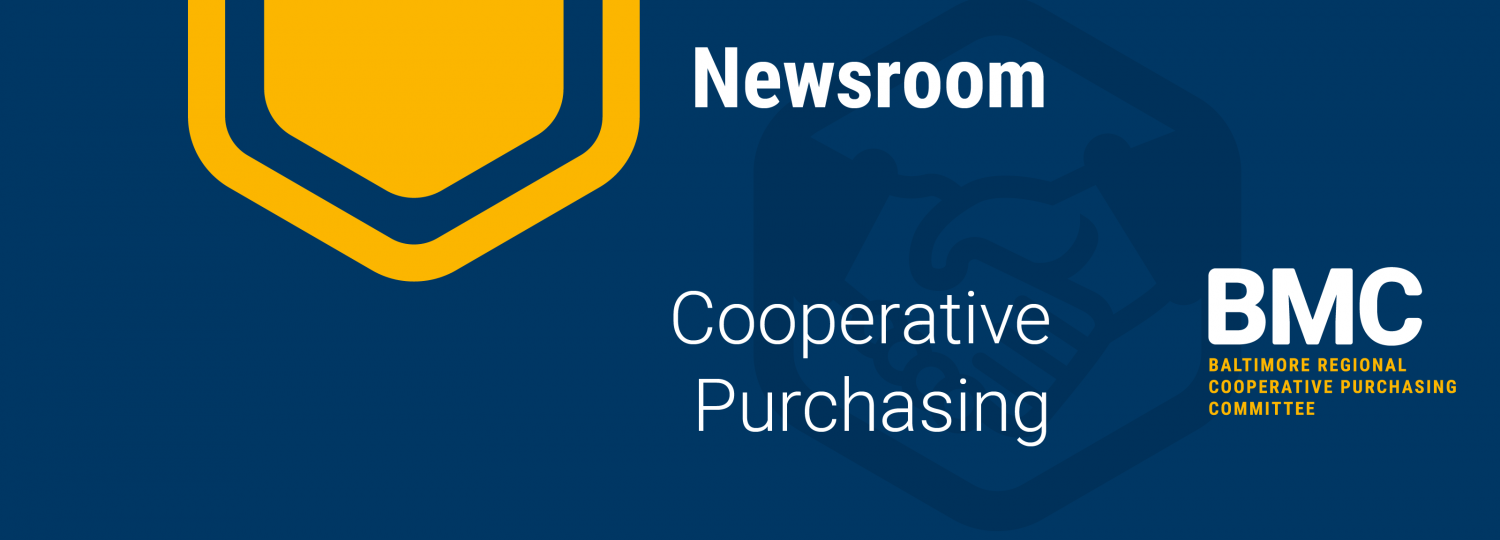
The Baltimore Regional Cooperative Purchasing Committee (BRCPC) recently released its 2021 Annual Report, outlining their work over the past year.
The report recaps activities of the committee including their procurement achievements in such unprecedented times, where the supply chain could not deliver essential supplies, such as N95 masks or certain food products. BRCPC was able to make these procurements, due largely to their willingness to adapt and collaborate through the committee.
In addition to these accomplishments, the Energy Board continues to be a great example of efficient and innovative government. BMC works with its member jurisdictions and the State of Maryland to leverage their collective government buying power. Savings are realized through purchasing in quantity and consolidating the administrative costs associated with procurement. Twenty-four members of the Energy Board, along with several other entities participate in the wholesale market cooperative procurements for their energy requirements.
The gross worth of BRCPC’s Energy Board is approximately $111 M for electric and natural gas commodities. The Energy Board, comprising all participating parties, is the largest BGE customer.
The BRCPC Energy Board’s primary focus is the oversight of the energy cost management and procurement programs for both electric and natural gas supply portfolios. This includes receiving, researching, and assessing energy market developments including renewable energy on an ongoing basis.
BRCPC looks forward to continued collaboration and success in 2022.
To read the full 2021 annual report, visit: https://baltometro.org/purchasing/about

Baltimore County and the Baltimore Metropolitan Council host the 13th Annual Meet the Primes Virtual event on Wednesday, October 13th, 2021, where small and minority owned businesses (MBE/SBE) are connected with prime contract bidders.
The event provides a chance for attendees to speak directly with a representative from a prime company or government agency that has identified sub-contracting needs for their current and upcoming projects.
Over 60 exhibitors attended this event.
The virtual event also hosted breakout sessions giving exhibitors the opportunity to hold discussions away from the group meeting. This allows businesses the opportunity to pick which exhibitors they would like to hear from, similar to visiting a booth at a physical event.
This event continues to empower those in our region to build new partnerships and access the buying capacity of our governments.

On Wednesday, October 28, 2020, The Baltimore Metropolitan Council’s (BMC) Baltimore Regional Cooperative Purchasing Committee (BRCPC) co-hosted the 12th Annual Meet the Primes event. This virtual procurement outreach event connects small and minority owned businesses (MBE/SBE) to prime contract bidders.
The event welcomed over 500 small and minority business participants.
Organized by Baltimore County, Meet the Primes utilized virtual training and presentation sessions to provide information to attendees. Participants reviewed updates in the financial systems for solicitations, submitting bids and obtaining purchase orders for new and existing vendors, as well as hosted discussions for potential vendors to learn about the various business resources including the BRCPC.
Small business representatives also met with select government agencies and prime companies during pre-scheduled one-to-one introduction meetings. These meetings presented opportunities for attendees to present their products and services directly to the procurement officials, buyers and decision makers who may be interested in their offerings.
In addition to the one-to-one sessions and virtual training and presentation sessions, the event also utilized business listings to display contact information creating a database of participating small and minority owned businesses.
This event presents unique opportunities for small and minority owned businesses, empowering those in our region to build new partnerships and access the buying capacity of our governments.
We are hopeful that we can return in-person for next year’s Meet the Primes event, scheduled for Wednesday, October 13, 2021.
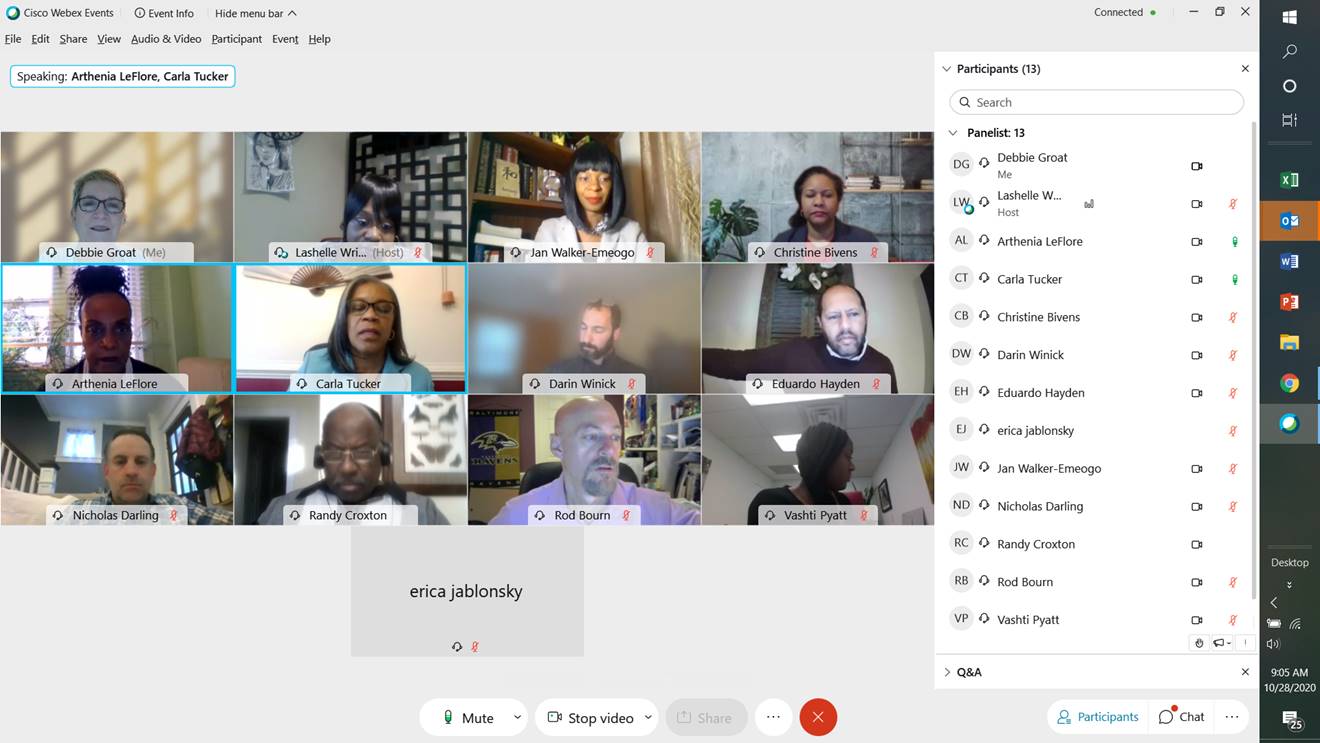 |

The COVID-19 pandemic continues to keep us apart. Many are staying at home, socially distancing and using personal protection equipment (PPE) when venturing out.
PPE has played a huge role in the response to the health crisis. Procuring this equipment during a time when supply was very low and demand was exponential has been a challenge that many experienced worldwide.
BMC's Director of Cooperative Purchasing, Debbie Groat, takes a deeper look at the supply chain for PPE, underscoring how it has changed throughout the pandemic. She also calls for the stabilization of a pricing structure for such material in an article she wrote for the MPAA Newsletter.
Read the article here:
Handling Price Escalators in an unstable supply chain
Escalators are used to encourage suppliers to participate in long-term contracts when price volatility would otherwise discourage participation with aggressive pricing. Escalators have been useful for a variety of reasons, such as fuel prices, trade tariffs, and under COVID19 where we have supply chain collapse due to soaring global demand for Personal Protection Equipment (PPE) and shortages in raw materials needed to manufacturer the PPE supplies. 3M’s N95 facemask that was normally priced between $0.50 - $0.60 each were coming in at the peak of COVID19 between $5.00 and $6.00. Standard fixed price contracting was out the door.
As emergency contracting begins to wane, we need competitive solutions for PPE requirements in the future. Based on the undependable supply chain during COVID19, a good price escalation clause and cooperative purchasing should be the procurement strategy that will garner the best pricing. The National Institute of Governmental Purchasing defines the Price Adjustment Clause:
“A clause in a contract allowing for adjustment in price in accordance with circumstances arising during the term of the contract. A provision that must be included in contracts requiring contractor certification of cost and pricing data stating that price, including profit or fee, shall be adjusted to exclude any significant sums by which the jurisdiction finds the price was increased because the contractor-furnished cost or pricing data was inaccurate, incomplete, or not current.”
This kind of clause requires thoughtful development and management to ensure an equitable contract. It also means that price adjustments are considered for escalation and de-escalation. While it may be more effort to maintain a contract with a price adjustment clause, it’s rewarded with more competition and competitors that give you their best price at the time of bid. Competitors are encouraged to give their best price because you have reduced some of the risk in bidding a long-term contract in a volatile market, such as PPE supplies. The following is an example of price adjustment clause considerations taken from the Federal Acquisition Department:
2-18.5 Fixed-Price Contract with Economic Price Adjustment
A fixed-price contract with economic price adjustment provides for upward and downward revision of the stated contract price upon the occurrence of specified contingencies. This type of contract establishes a basis for measuring fluctuations so that price adjustments are limited to contingencies beyond the supplier’s control and reflect actual market fluctuations. Upward adjustments are limited by establishing a reasonable ceiling, and provisions are included for downward adjustments when prices or rates fall below base levels established in the contract.
There are two types of economic price adjustments:
- Adjustments based on ACs of labor or materials — price adjustments based on actual increases or decreases in the costs of specified labor or materials during performance.
- Adjustments based on cost indexes of labor or materials — price adjustments based on increases or decreases in labor or material cost standards or indexes specifically identified in the contract.
Fixed-price contracts with economic price adjustment are appropriate when there is serious doubt about the stability of market or labor conditions during an extended period of performance and when contingencies that would otherwise be included in a FFP contract are identifiable and can be covered separately in the contract. Their usefulness is limited by the difficulties of administering them.
Fixed-price contracts providing for an economic price adjustment based on ACs of labor or materials must include Clause 2-28: Economic Price Adjustment — Labor and Materials, and fixed-price contracts providing for an economic price adjustment based on cost indexes of labor or materials must include Clause 2-29: Economic Price Adjustment (Index Method).”
The main reason for using a price adjustment clause is to discourage the bidder from setting their price high enough to offset any expected or unexpected future increases that are out of their control. COVID19 has raised a bidder’s concern over their ability to predict the “unexpected increases.” A best practice to drive your PPE bid prices down is to aggregate as much volume as possible through cooperative purchasing and use a price adjustment clause when it is reasonable to do so. An example of a Federal price adjustment clause is found in the Reference section below. Why Federal you ask? Well, since much of the PPE we are purchasing under COVID19 may be reimbursable by the Federal Government, it may be good to see what type of clause they find acceptable should we find ourselves in a similar situation in the future.
One final note about price adjustment clauses. Do not confuse the COVID19 market circumstances with your force majeure clause, that is normally used as protection against natural disasters or other catastrophes as most recently seen in the explosion in Beirut. Price adjustment clauses are needed for things such as tariffs and COVID19 supply chain collapse.
Debbie Groat, Chair
MPPA Cooperative Purchasing Subcommittee
Reference:
- https://www.fhwa.dot.gov/programadmin/contracts/ta50803.cfm
- https://www.nigp.org/docs/default-source/docs/education/OnlineDict/DictP.htm
- https://www.acquisition.gov/content/52216-4-economic-price-adjustment-labor-and-material Found below:
Economic Price Adjustment-Labor And Material (Jan 2017)
(a) The Contractor shall notify the Contracting Officer if, at any time during contract performance, the rate of pay for labor (including fringe benefits) or the unit prices for material shown in the Schedule either increase or decrease. The Contractor shall furnish this notice within 60 days after the increase or decrease, or within any additional period that the Contracting Officer may approve in writing, but not later than the date of final payment under this contract. The notice shall include the Contractor’s proposal for an adjustment in the contract unit prices to be negotiated under paragraph (b) of this clause, and shall include, in the form required by the Contracting Officer, supporting data explaining the cause, effective date, and amount of the increase or decrease and the amount of the Contractor’s adjustment proposal.
(b) Promptly after the Contracting Officer receives the notice and data under paragraph (a) of this clause, the Contracting Officer and the Contractor shall negotiate a price adjustment in the contract unit prices and its effective date. However, the Contracting Officer may postpone the negotiations until an accumulation of increases and decreases in the labor rates (including fringe benefits) and unit prices of material shown in the Schedule results in an adjustment allowable under paragraph (c)(3) of this clause. The Contracting Officer shall modify this contract (1)to include the price adjustment and its effective date and (2)to revise the labor rates (including fringe benefits) or unit prices of material as shown in the Schedule to reflect the increases or decreases resulting from the adjustment. The Contractor shall continue performance pending agreement on, or determination of, any adjustment and its effective date.
(c) Any price adjustment under this clause is subject to the following limitations:
(1) Any adjustment shall be limited to the effect on unit prices of the increases or decreases in the rates of pay for labor (including fringe benefits) or unit prices for material shown in the Schedule. There shall be no adjustment for-
(i) Supplies or services for which the production cost is not affected by such changes;
(ii) Changes in rates or unit prices other than those shown in the Schedule; or
(iii) Changes in the quantities of labor or material used from those shown in the Schedule for each item.
(2) No upward adjustment shall apply to supplies or services that are required to be delivered or performed before the effective date of the adjustment, unless the Contractor’s failure to deliver or perform according to the delivery schedule results from causes beyond the Contractor’s control and without its fault or negligence, within the meaning of the Default clause.
(3) There shall be no adjustment for any change in rates of pay for labor (including fringe benefits) or unit prices for material which would not result in a net change of at least 3 percent of the then-current total contract price. This limitation shall not apply, however, if, after final delivery of all line items, either party requests an adjustment under paragraph (b) of this clause.
(4) The aggregate of the increases in any contract unit price made under this clause shall not exceed 10 percent of the original unit price. There is no percentage limitation on the amount of decreases that may be made under this clause.
(d) The Contracting Officer may examine the Contractor’s books, records, and other supporting data relevant to the cost of labor (including fringe benefits) and material during all reasonable times until the end of 3 years after the date of final payment under this contract or the time periods specified in subpart 4.7 of the Federal Acquisition Regulation (FAR), whichever is earlier.
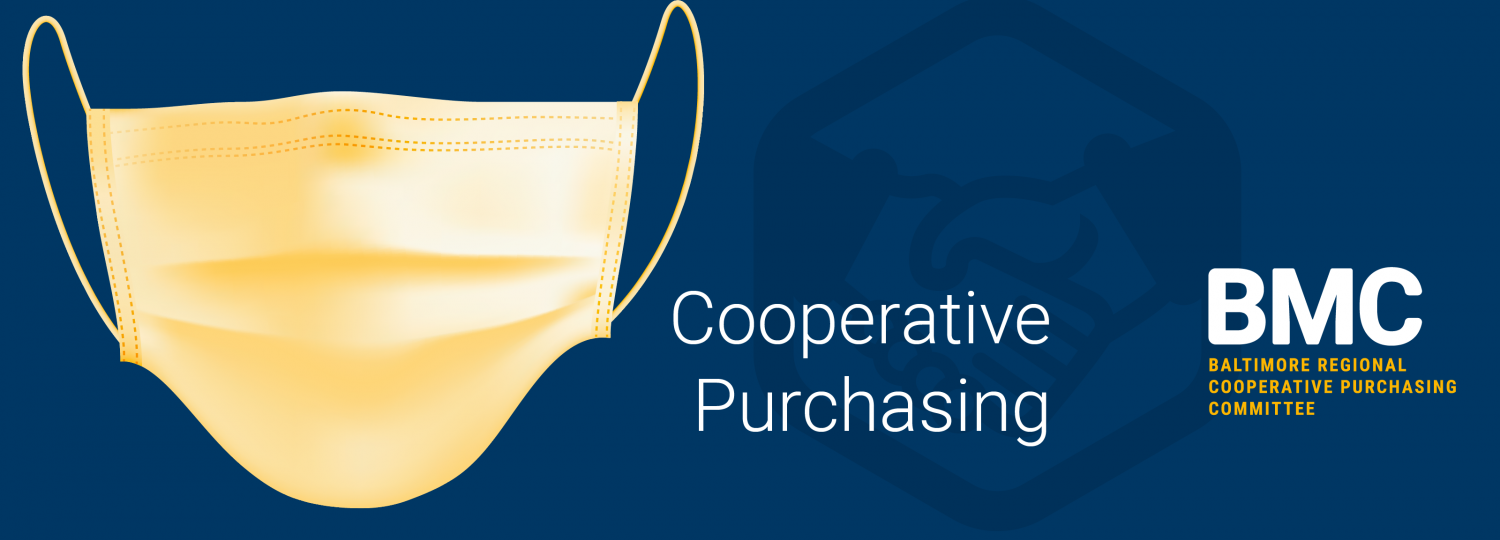
Over the last several months, BMC helped organizations in the region procure much needed personal protection equipment (PPE), including masks, gloves, cleaning supplies and more. Through a cooperative purchasing agreement offered by BMC and W.B. Mason, local groups have gained access to affordable PPE when they needed it most.
In the midst of the COVID-19 crisis, many nonprofits remained open – or were struggling to re-open. Several faced both unplanned costs to purchase necessary supplies and equipment, as well as trouble locating available products.
Utilizing CARES Act Coronavirus Relief Funds from Anne Arundel County, Arundel Community Development Services (ACDS) was able to order supplies accessed through BMC’s cooperative purchasing program to fulfill the needs of 20 nonprofit service providers in the county. Orders ranged from cleaning products, sanitizers, and masks to gloves and disposable thermometer covers.
“Community-based nonprofits are on the front lines of serving our most vulnerable residents every day,” said Steuart Pittman, Anne Arundel County Executive. “I’m proud of our partners at BMC and ACDS for connecting these organizations to the resources they need in order to continue their essential missions.”
Several local groups reported experiencing supply shortages when shopping for PPE. Many were grateful for the assistance, including the Boys & Girls Club of Annapolis & Anne Arundel County.
“In a world of ‘back orders’ and ‘out of stock’ we can't begin to tell you how amazing it was to be contacted by ACDS about PPE so that we can prepare to reopen safely,“ said Jennifer Logratteria, Boys & Girls Club of Annapolis & Anne Arundel County Development Director. “With so many roadblocks in our path as we navigate these unprecedented times, thank you for being a beacon of light for our Clubs and our county's youth.”
The Housing Authority of the City of Annapolis also utilized the contract to buy masks for their residents.
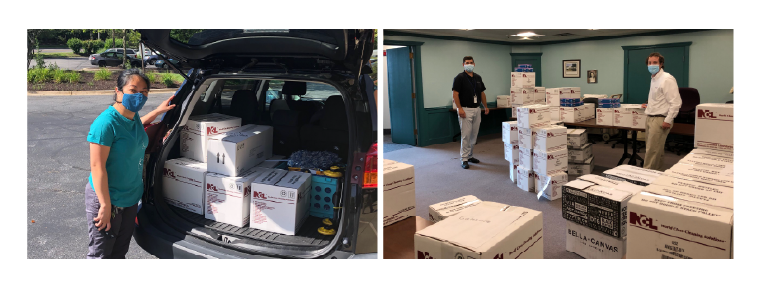 |

The protective measures taken to stop the spread of COVID-19 have caused countless disruptions to the systems and standards so many have worked to build.
COVID-19 has emphasized the prioritization of safety measures and abrupt shifts in supply, demand, materials and resources, causing many to adapt their operating procedures.
BMC’s Director of Cooperative Purchasing, Debbie Groat, authored an article for the Maryland Public Purchasing Association (MPAA) Newsletter. In the article, Groat, who also serves as Chair of the Cooperative Purchasing Subcommittee for MPAA, details the changes in operating procedures for cooperative purchasing post COVID-19.
The article examines the shifts made in cooperative purchasing to meet the needs of the region during a time where demand was overwhelming.
See the below article excerpted from the MPAA Newsletter:
Post COVID19 – Changes in Operating Procedures - Cooperative Purchasing
Emergency management prepares for unexpected emergency situations that may arise. Risks are evaluated and plans are put into place at every level of government. The cooperation between the Federal Emergency Management Agency (FEMA), the Maryland Emergency Management Agency (MEMA), and local emergency managers is well coordinated. This collaboration and cooperation is what makes unforeseen emergencies more manageable. When it comes to purchasing in emergencies, contractors and contracts are lined up and ready to be used to provide the supplies and services needed to resolve the emergency. When these resources are exhausted, we look to other cooperative contracts and on-demand purchasing. That strategy worked very well for regional emergencies, such as the Howard County floods or Baltimore City riots. But the COVID19 pandemic was global and raised the bar for the need to globally cooperate and collaborate.
According to the FEMA COVID-19 Pandemic Operational Guidance for the 2020 Hurricane Season May 2020: “As a result of the COVID-19 pandemic, the Nation is facing unprecedented challenges as we respond to additional disasters, anticipate emergent incidents, and prepare for the 2020 hurricane season. Although the operating environment has changed, the Federal Emergency Management Agency’s (FEMA) mission of helping people before, during, and after disasters remains the same. Federal, state, local, tribal, and territorial (SLTT) officials, along with the private sector and nongovernmental organizations (NGO), must partner together to fulfill their respective missions and help disaster survivors. As the Nation continues to respond to and recover from COVID-19 while posturing for the coming hurricane season, emergency managers must continue to operate under a framework of a locally executed, state managed, and federally supported approach to incident stabilization.”
New challenges in mid and post-COVID19 stabilization reared their ugly head because this time, the highest risk was a supply demand that was impossible to meet under our current operating practices. Let’s look at one operating procedure that may see some drastic changes, Just-In-Time (JIT) ordering.
Credit for the origin of JIT practices was traced back in the 60’s to Japan and Toyota Manufacturing. It did not become popular in the United States until the 80’s. According to Wikipedia; The main reasons prompting production facilities to use JIT included: inventory reduction, labor cost reduction, space reduction, stock reduction, production increase, quality improvement, throughput time reduction, and standard hours reduction. In short, the relationship between the raw material supplier and the product manufacturer was developed so the manufacturer could depend more heavily on the raw materials being available precisely when needed or just-in-time. This dependency on the supply chain became stronger and more reliable over time. Beyond manufacturing, government adopted JIT for office, custodial, and MRO supplies. Warehouses became smaller or nonexistent, and stock on hand was minimized. There were tremendous gains in efficiency and reductions of the cost of holding unnecessary stock. The trust in the supplier’s ability to meet our demands was strong. That is until COVID19.
When COVID19 hit in the United States, we followed other countries already dealing with the virus. The demand for PPE was quickly soaring on a global level exceeding normal stocking levels. Anne Arundel County’s Emergency Management Department studied the PPE usage in two area hospitals and found that their COVID19 burn rates for PPE supplies were 2 to 3 times the normal usage.
The global demand for personal protective equipment stressed the supply chain to unimaginable levels. And, frankly, it broke under the pressure. Government turned to unlikely sources, such as distilleries and clothiers, to modify their operations to make the products that were needed, such as hand sanitizer and non-surgical gowns. We saw soaring transportation costs and manufacturing plants become overwhelmed to the degree that their distributors refused additional orders due to the high risk of not being able to fulfill the order. Equally challenging, was the dependency on foreign manufacturing for these PPE supplies when they were desperately needed in that country. Product was delivered to the tarmac only to be purchased, on site, for a higher price. The supply chain was in chaos and government could not depend on just in time, near in time or anytime delivery.
Wikipedia goes on to say, “Natural and man-made disasters will disrupt the flow of energy, goods and services. The down-stream customers of those goods and services will, in turn, not be able to produce their product or render their service because they were counting on incoming deliveries "just in time" and so have little or no inventory to work with. The disruption to the economic system will cascade to some degree depending on the nature and severity of the original disaster. The larger the disaster the worse the effect on just-in-time failures.”
“The COVID-19 pandemic has caused disruption in JIT practices, with various quarantine restrictions on international trade and commercial activity in general interrupting supply while lacking stockpiles to handle the disruption; along with increased demand for medical supplies like PPE (Personal Protective Equipment) and ventilators, and even panic buying, including of various domestically manufactured (and so less vulnerable products) like panic buying of toilet paper, disturbing regular demand. This has led to suggestions that stockpiles and diversification of suppliers should be more heavily focused.”
